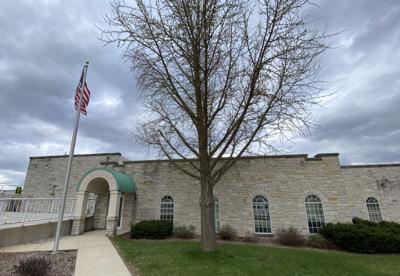WAUKESHA — A Minnesota-based contractor who worked on the pipelines bringing Great Lakes water to Waukesha is suing the city, alleging it has withheld payment of sums related to construction delays the firm says were beyond its control.
S.J. Louis Construction, Inc., of Rockville, Minnesota, filed suit against the city in federal court in Milwaukee on Feb. 29, seeking nearly $28.16 million plus 12% interest annually.
The project to convert Waukesha’s water supply from wells to Great Lakes water was seen as the most feasible and sustainable answer for the city to comply with federal requirements regarding radium levels, a naturally occurring radioactive element. The project, more than 20 years in the making, was estimated to cost $286 million to build pipelines to get water from Milwaukee transported to Waukesha, which would then use and treat the water before returning it to the Great Lakes basin. The city with great fanfare announced the construction was complete, with the spigots turned on, last fall.
S.J. Louis was the low bidder on three of seven segments and contract packages to construct more than 26 combined miles of pipelines for return flow of water based on plans and specifications supplied by the city. But S.J. Louis said its work was "delayed, disrupted and changed by several factors which were not its responsibility and were beyond its control and outside its knowledge at the time (of) the (project’s) bid."
Among the problems the suit cited were conflicts in working around the dense network of sewer, water, electrical and fiber utilities along the project’s path, with some missing from the designs and others marked in wrong places. Another problem cited was design errors in plans for horizontal directional drilling underground, which the company said it fixed at its own expense to keep the project rolling after the city refused to undertake a redesign, or when third-party engineers would not provide confirming calculations on the city’s designs. The company complained of delays of permits from the U.S. Army Corps of Engineers and the state Department of Transportation, which it said set back progress and the city refused to extend contract timelines.
The suit said the city unjustly withheld compensatory costs, and also disputed the costs of work performed, and insisted on requests to change the arrangement to make up for the extra costs incurred in delays and then denied them.
“As a result of the foregoing, SJ Louis’s work was rendered far more expensive than planned, and it was significantly delayed. In addition, SJ Louis suffered several excusable delays which, in combination, resulted in completion of (p)rojects over a year after the originally scheduled completion dates for reasons that were not its responsibility or within its control and for which SJ Louis in entitled to extra time and additional costs,” the suit said. “Notably, even though SJ Louis was delayed in completing its contract packages, the entire (p)program was not delayed, and in the (c)ity’s own newsletter, it announced that the transition to Lake Michigan water was completed ahead of schedule ...
“To make matters worse, the (c)ity continues to deny that SJ Louis has completed its work on the (p)rojects, while at the same time using the (p)rojects to sell water to its customers. SJ Louis achieved substantial completion on the (p)rojects on June 28, 2023 for (two contract packages) and July 24, 2023, for (a third),” the suit said. “The (c)ity began to use the work performed by SJ Louis to convey water shortly thereafter, and began collecting revenue on SJ Louis’s work as early as Oct. 9, 2023. Nevertheless, the (c)ity has still wrongfully refused to acknowledge that SJ Louis has achieved ‘substantial completion’ of its work, and has also wrongfully continued to withhold a set daily rate of damages called (l)iquidated (d)amages (‘LDs’) for SJ Louis’ alleged late completion as setoffs from payments to SJ Louis.”
“It’s unfortunate that the city of Waukesha and its designers mismanaged taxpayer dollars through its negligent handling of the project and that it was unwilling to objectively work through these issues outside of the courts. S.J. Louis dutifully completed its obligations for the city of Waukesha, and any claims to the contrary are unequivocally false and not based in fact,” Frank Wizner, project manager, S.J. Louis, said in a statement issued by the law firm of Michael Best & Friedrich.
Waukesha’s formal response to the lawsuit is due in federal court today.
But City Attorney Brian Running said such disagreements can happen on a project of this scope.
“When you have a big project like this there are going to be issues that come up. There certainly were issues. The water utility and their consultants and engineers worked with SJ Louis over the last several years on each of these issues. These things happen on big construction projects like this. When issues would arise we’d discuss them. Most of the issues are resolved; some were unresolved,” Running said.
“They are making claims for payments. We disagree with them. It’s a good faith dispute over amounts that are owned and they have now chosen to try to resolve those unresolved issues in federal court. That’s one way to resolve it. We are responding,” Running said. “We have the Stafford Rosenbaum law firm in Madison that has been provided to us for defense by our liability insurance company and they are going to file an answer here shortly and we will just go through the process of litigation and most likely resolving issues before we have to go to a trial.”
Running said the sides are “very far apart on some of these numbers and naturally we believe their claims are baseless,” adding, “I am just as in the dark as you are on what the basis for what some of the numbers are.”
Running added on a “project like this, where a lot of work is happening underground, the situation is kind of fluid. You are going to encounter things that are unexpected, you are going to have to change plans along the way. When you’re boring underground you’re going to run into things that were not anticipated. The permitting process, that depends upon third parties, and can be uncertain sometimes and can take longer than you think. There’s a lot of variables ...
“Sure, you sign a contract to try to ... button down as much as you can, but unfortunately there are going to be variables you can’t foresee in a process like this.”
Discovery in the case — the exchange of information — is projected to go into September 2025.














